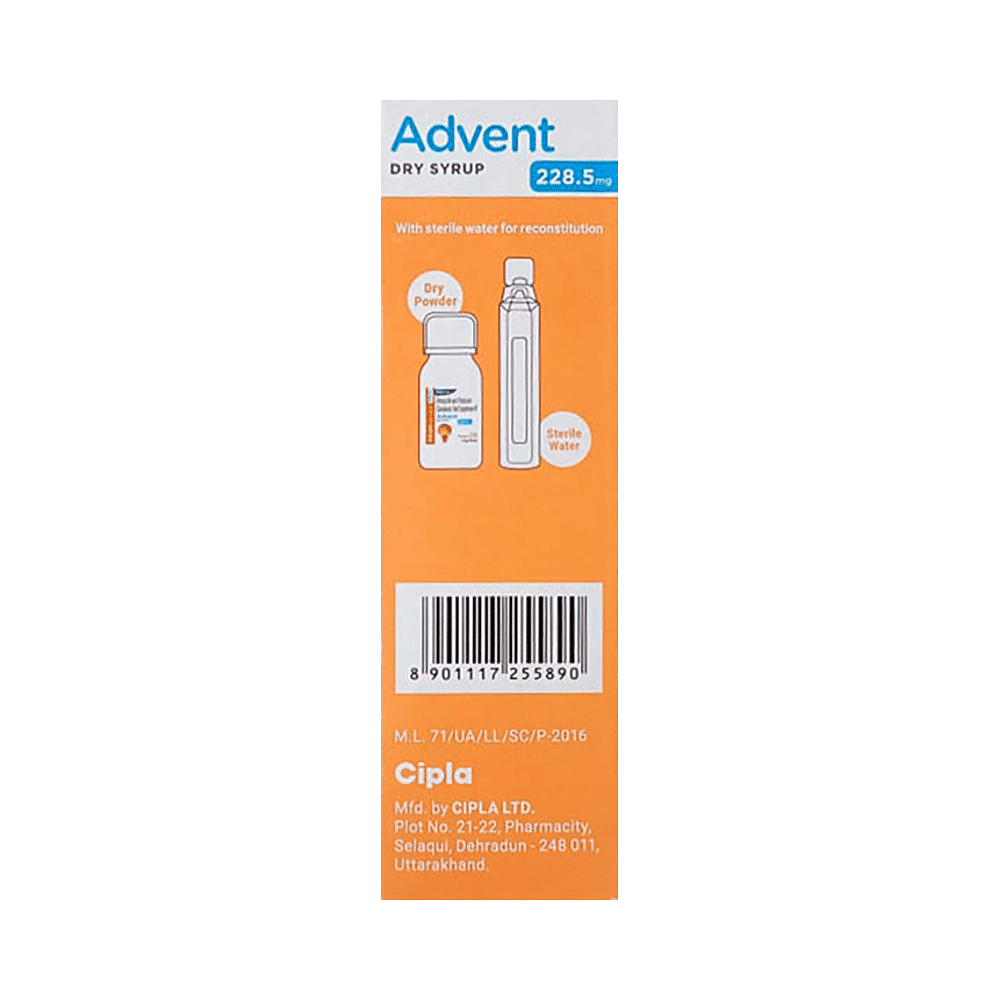
Anclov Dry Syrup
Manufacturer
Morecare Pharmatec Pvt Ltd
Salt Composition
Amoxycillin (200mg/5ml) + Clavulanic Acid (28.5mg/5ml)
Key Information
Short Description
Anclov Dry Syrup is an antibiotic medicine that helps treat bacterial infections of the ear, nose, throat, chest, lungs, teeth, skin, and urinary tract.
Dosage Form
Dry Syrup
Introduction
Anclov Dry Syrup is an antibiotic medicine that helps treat bacterial infections of the ear, nose, throat, chest, lungs, teeth, skin, and urinary tract. It is capable of killing bacteria that have become resistant to other therapies and thus also helps treat tuberculosis that is resistant to other treatments.
Directions for Use
Your child must complete the entire course of antibiotics. Stopping too soon may cause the bacteria to multiply again or cause another infection.
How it works
Anclov Dry Syrup is an antibiotic. It has two active agents amoxycillin and clavulanic acid. Amoxycillin works by preventing the formation of the bacterial protective covering (cell wall) essential for the survival of the bacteria. Whereas clavulanic acid serves a special purpose of inhibiting an enzyme (beta-lactamase) that is produced by resistant bacteria. This makes the combination of amoxycillin and clavulanic acid an effective line of treatment for many types of infections.
Quick Tips
Your child must complete the entire course of antibiotics. Stopping too soon may cause the bacteria to multiply again or cause another infection. Your child may have a bitter taste in the mouth after the intake of Anclov Dry Syrup. Eating citrus fruit or sipping plenty of water or fruit juice may help. Encourage your child to drink plenty of water in case diarrhea develops as a side effect. Never give Anclov Dry Syrup until and unless prescribed by the doctor. Do not give Anclov Dry Syrup to treat common cold and flu-like symptoms caused by viruses. Never save medicine for future illnesses. Check ‘expiry’ before giving Anclov Dry Syrup to your child. Immediately discard all the expired medicines. Stop Anclov Dry Syrup immediately if your child develops an itchy rash, facial swelling, or breathing difficulty. Report to the doctor without any delay.
Related Medicines

Advent 228.5mg Dry Syrup Tangy Orange

Reliclav Dry Syrup

Clavilon Dry Syrup

Zerimox CV Dry Syrup

Espimox CV Dry Syrup

Clavoixi Dry Syrup

Moxpro CV Dry Syrup

Fabmentin Dry Syrup

Jyomox CV Forte Dry Syrup

Xyclav Dry Syrup
Frequently asked questions
Can other medicines be given at the same time as Anclov Dry Syrup?
Anclov Dry Syrup can sometimes interact with other medicines or substances. It is important to inform your child's doctor about any other medications they are taking before starting Anclov Dry Syrup. Consulting a healthcare professional is crucial for safe medication administration.
Can I get my child vaccinated while on treatment with Anclov Dry Syrup?
Generally, antibiotics do not interfere with the ingredients in vaccines or cause adverse reactions in children who have recently been vaccinated. However, it is crucial for your child to recover from the illness before receiving a vaccine. Once your child feels better, the vaccine can be administered.
Which lab tests may my child undergo while taking Anclov Dry Syrup on a long-term basis?
In case of prolonged therapy with Anclov Dry Syrup, monitoring kidney and liver function may be considered periodically to ensure your child's health.
Can I give a higher than the recommended dose of Anclov Dry Syrup to my child?
Giving a higher dose of this medicine can increase potential side effects. If your child experiences worsening symptoms, please contact their doctor for re-evaluation.
Can I stop giving Anclov Dry Syrup to my child when the symptoms are relieved?
No, it is crucial not to discontinue this medication before completing the prescribed course. While your child may show improvement, the infection may still be ongoing and benefits from the medicine can linger.
Can the use of Anclov Dry Syrup cause diarrhea?
Yes, Anclov Dry Syrup may cause diarrhea due to its antibiotic properties. Disruption of beneficial bacteria in the child's stomach can also trigger diarrhea. If your child experiences diarrhea, ensure they drink fluids and consult a doctor if it persists or signs of dehydration (dark-colored urine, reduced urination frequency) are present.
Do all viral common colds result in secondary bacterial infection?
Most of the time, bacterial infections do not follow viral infections. In fact, giving antibiotics in a viral infection can lead to increased side effects for your child. Only use antibiotics after consulting your doctor.
The mucus coming out of my child’s nose is yellow-green. Is it a sign of a bacterial infection?
Yellow or green mucus in the nose does not always indicate a bacterial infection during a common cold. The normal change in mucus can thicken and become yellow or green.
Is there any sign which shows that my child needs immediate medical attention?
You must immediately contact your child's doctor if they experience serious allergic reactions (difficulty breathing, skin rash), gastrointestinal distress (diarrhea, vomiting), or liver damage (weakness, paleness). Though rare, these symptoms require expert assessment.


